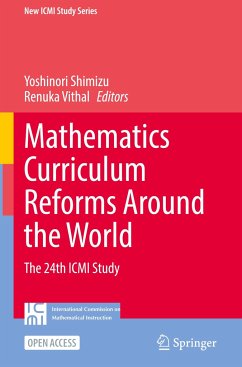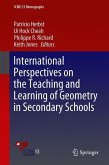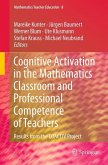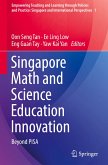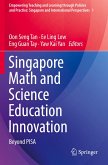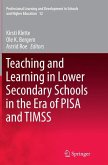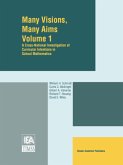Mathematics Curriculum Reforms Around the World
The 24th ICMI Study
Herausgegeben:Shimizu, Yoshinori; Vithal, Renuka
Mathematics Curriculum Reforms Around the World
The 24th ICMI Study
Herausgegeben:Shimizu, Yoshinori; Vithal, Renuka
- Gebundenes Buch
- Merkliste
- Auf die Merkliste
- Bewerten Bewerten
- Teilen
- Produkt teilen
- Produkterinnerung
- Produkterinnerung
This Open Access volume by the International Commission on Mathematical Instruction (ICMI) is an outcome of the ICMI Study 24 and gives a status-quo of school mathematics reform around the world and what we can learn from this movement. Each theme and section of the book offers descriptions and analyses of multiple case studies in different countries and contexts, along with opportunities to compare, contrast and learn from these diverse experiences. The volume provides a synthesis and meta-analysis of the different historical, geographical and global aspects of school mathematics reforms and…mehr
Andere Kunden interessierten sich auch für
![International Perspectives on the Teaching and Learning of Geometry in Secondary Schools International Perspectives on the Teaching and Learning of Geometry in Secondary Schools]() International Perspectives on the Teaching and Learning of Geometry in Secondary Schools90,99 €
International Perspectives on the Teaching and Learning of Geometry in Secondary Schools90,99 €![Cognitive Activation in the Mathematics Classroom and Professional Competence of Teachers Cognitive Activation in the Mathematics Classroom and Professional Competence of Teachers]() Cognitive Activation in the Mathematics Classroom and Professional Competence of Teachers112,99 €
Cognitive Activation in the Mathematics Classroom and Professional Competence of Teachers112,99 €![Singapore Math and Science Education Innovation Singapore Math and Science Education Innovation]() Singapore Math and Science Education Innovation127,99 €
Singapore Math and Science Education Innovation127,99 €![Singapore Math and Science Education Innovation Singapore Math and Science Education Innovation]() Singapore Math and Science Education Innovation127,99 €
Singapore Math and Science Education Innovation127,99 €![Mathematics Education in Singapore Mathematics Education in Singapore]() Mathematics Education in Singapore119,99 €
Mathematics Education in Singapore119,99 €![Teaching and Learning in Lower Secondary Schools in the Era of PISA and TIMSS Teaching and Learning in Lower Secondary Schools in the Era of PISA and TIMSS]() Teaching and Learning in Lower Secondary Schools in the Era of PISA and TIMSS38,99 €
Teaching and Learning in Lower Secondary Schools in the Era of PISA and TIMSS38,99 €![Many Visions, Many Aims Many Visions, Many Aims]() SchmidtMany Visions, Many Aims77,99 €
SchmidtMany Visions, Many Aims77,99 €-
-
-
This Open Access volume by the International Commission on Mathematical Instruction (ICMI) is an outcome of the ICMI Study 24 and gives a status-quo of school mathematics reform around the world and what we can learn from this movement. Each theme and section of the book offers descriptions and analyses of multiple case studies in different countries and contexts, along with opportunities to compare, contrast and learn from these diverse experiences.
The volume provides a synthesis and meta-analysis of the different historical, geographical and global aspects of school mathematics reforms and explores in which way curricula are elaborated, proposed, changed, and reorganized. It offers a more informed and comprehensive analysis of the roles of different actors and of the many aspects influencing and shaping mathematics curriculum reforms that are taking or have taken place. It also explores the possibilities and means to tackle a curricular reform in the current scenario welivein and how to unfold future developments.
This book will be of interest to practitioners and scholars with an interest in school mathematics curriculum reforms. It will also be a useful resource to those involved in school mathematics curriculum reform initiatives by providing current information about the curriculum changes that are taking place in respect of content, teacher education, educational materials, and a range of implementation challenges across diverse contexts.
The volume provides a synthesis and meta-analysis of the different historical, geographical and global aspects of school mathematics reforms and explores in which way curricula are elaborated, proposed, changed, and reorganized. It offers a more informed and comprehensive analysis of the roles of different actors and of the many aspects influencing and shaping mathematics curriculum reforms that are taking or have taken place. It also explores the possibilities and means to tackle a curricular reform in the current scenario welivein and how to unfold future developments.
This book will be of interest to practitioners and scholars with an interest in school mathematics curriculum reforms. It will also be a useful resource to those involved in school mathematics curriculum reform initiatives by providing current information about the curriculum changes that are taking place in respect of content, teacher education, educational materials, and a range of implementation challenges across diverse contexts.
Produktdetails
- Produktdetails
- New ICMI Study Series
- Verlag: ICMI-IMU / Springer / Springer International Publishing / Springer, Berlin
- Artikelnr. des Verlages: 978-3-031-13547-7
- 1st ed. 2023
- Seitenzahl: 604
- Erscheinungstermin: 29. Juni 2023
- Englisch
- Abmessung: 241mm x 160mm x 36mm
- Gewicht: 1172g
- ISBN-13: 9783031135477
- ISBN-10: 3031135474
- Artikelnr.: 64280429
- Herstellerkennzeichnung
- Springer-Verlag GmbH
- Tiergartenstr. 17
- 69121 Heidelberg
- ProductSafety@springernature.com
- New ICMI Study Series
- Verlag: ICMI-IMU / Springer / Springer International Publishing / Springer, Berlin
- Artikelnr. des Verlages: 978-3-031-13547-7
- 1st ed. 2023
- Seitenzahl: 604
- Erscheinungstermin: 29. Juni 2023
- Englisch
- Abmessung: 241mm x 160mm x 36mm
- Gewicht: 1172g
- ISBN-13: 9783031135477
- ISBN-10: 3031135474
- Artikelnr.: 64280429
- Herstellerkennzeichnung
- Springer-Verlag GmbH
- Tiergartenstr. 17
- 69121 Heidelberg
- ProductSafety@springernature.com
¿Professor Yoshinori Shimizu, Ph. D, is a mathematics educator who works at Graduate School of Comprehensive Human Sciences of University of Tsukuba, one of the major research institutions in Japan. He finished his Ph.D in Mathematics Education at Doctoral Program in Education, University of Tsukuba. He has been working at institutions such asTokyo Gakugei University, Indiana University (USA) as visiting scholar, and University of Tsukuba He was a member of Mathematics Expert Group (MEG) for OECD/PISA 2003, 2006, 2009. He was a consultant for 1995 TIMSS Videotape Classroom Study. He is one of the founders of Learner's Perspective Study (LPS), a sixteen countries comparative study on mathematics classrooms and has been the Japanese team leader of the project. He was a member of the International Committee of the International Group for the Psychology of Mathematics Education (2005-2009). He is the vice president of Japan Society of Mathematical Education. He was the co-chair forthe ICMI Study 24 conference held in November 2018 in Tsukuba, Japan. Professor Renuka Vithal is the former Deputy Vice-Chancellor for Teaching and Learning, Dean of Education and Professor of Mathematics Education of the University of KwaZulu-Natal; and is currently Deputy Vice-Chancellor for Academic Affairs at Fort Hare Univeristy. She is also a member of the Board of Trustees of CASME. Professor Vithal obtained her MPhil in mathematical education from the University of Cambridge in the United Kingdom and her doctoral degree in natural sciences from Aalborg University in Denmark. She began her career as a mathematics teacher and proceeded to work for institutions such as the University of Durban Westville and University of KwaZulu-Natal where she attained full professorship in mathematics education. She is recognised internationally as a scholar in the social, cultural and political dimensions of mathematics education.
Foreword: Frederick Leung.- International Program Committee.- Part I: Introduction to ICMI Study 24: 1: School Mathematics Curriculum Reforms: Widespread Practice but Under-researched in Mathematics Education: Yoshinori Shimizu and Renuka Vithal.- 2: School Mathematics: A Bipolar Subject: Jeremy Kilpatrick.- Part II: Theme A - Learning from the Past: Driving Forces and Barriers Shaping Mathematics Curriculum Reforms: 3: Introduction: Marianna Bosch and Niamh O'Meara.- 4: International Co-operation and Influential Reforms: Katalin Gosztonyi, Marja van den Heuvel-Panhuizen, Naomichi Makinae, Shizumi Shimizu and Marc van Zanten.- 5: Learning from the Past: Case Studies of Past 'Local' Curriculum Reforms: Niamh O'Meara and Jasmina Milinkovic.- 6: The Role of Values and Culture in Past Mathematics Curriculum Reforms: Maria Bartolini Bussi, Jasmina Milinkovic and Zahra Gooya.- 7: Curriculum Reforms and the Construction of the Knowledge to be Taught: Marianna Bosch, Thu-HuongVu-Nhu and Dyana Wijayanti.- 8: Conclusion: Final Considerations: Driving Forces and Barriers Affecting Curriculum Reforms: Marianna Bosch and Niamh O'Meara.- Part III: Theme B - Analysing School Mathematics Curriculum Reforms for Coherence and Relevance: 9: Introduction: Will Morony.- 10: Coherence in a Range of Mathematics Curriculum Reforms: Will Morony.- 11: Coherence and Relevance Relating to Mathematics and Other Disciplines: Simon Modeste, Joaquín Giménez, José Luis Lupiáñez, Jaime Carvalho e Silva and Nga Nguyen Thi.- 12: Coherence and Relevance of Materials and Technologies to Support Mathematics Curriculum Reforms: Jennie Golding.- 13: What Theories and Methodologies Are Appropriate for Studying Phenomena Related to Mathematics Curriculum Reforms?: Berta Barquero, Britta Eyrich Jessen, Juan Ruiz-Hidalgo and Jennie Golding.- 14: Conclusion: Achieving Coherence and Relevance in Mathematics Curriculum Reforms: Some Guiding Principles: Will Morony.- Part IV: Theme C -Implementation of Reformed Mathematics Curricula Within and Across Different Contexts and Traditions.- 15: Introduction: Angel Ruiz.- 16: A First Exploration to Understand Mathematics Curricula Implementation: Results, Limitations and Successes: Angel Ruiz, Mogens Niss, Michèle Artigue, Yiming Cao and Enriqueta Reston.- 17: Towards a Model for Monitoring and Evaluating Curricular Reforms: Steve Thornton, Maitree Inprasitha, Angel Ruiz, Masami Isoda, Narumon Changsri and Kristen Tripet.- 18: Teachers, Resources, Assessment Practices: Role and Impact on the Curricular Implementation Process: Alf Coles, Luis Rodríguez-Muñiz, Ida Ah Chee Mok, Angel Ruiz, Ronnie Karsenty, Francesca Martignone, Iman Osta, Federica Ferretti and Thi Tan An Nguyen.- 19: Conclusion: 'Laws' of Curriculum Implementation and the Future in which We Are Living: Angel Ruiz.- Part V: Theme D - Globalisation and Internationalisation and their Impacts on Mathematics Curriculum Reforms.- 20: Introduction: Max Stephens, Djordje Kadijevich, Mogens Niss, Nadia Azrou and Yukihiko Namikawa.- 21: The Evolution and Uptake of Numeracy and Mathematical Literacy as Drivers for Curriculum Reform: Merrilyn Goos and Kathy O'Sullivan.- 22: Impacts of TIMSS and PISA on Mathematics Curriculum Reforms: Djordje Kadijevich, Max Stephens, Armando Solares-Rojas and Raisa Guberman.- 23: Emergence of Computational/Algorithmic Thinking and its Impact on the Mathematics Curriculum: Djordje Kadijevich, Max Stephens and Abolfazl Rafiepour.- 24: Conclusion: Future Visions of the Impact of Internationalisation and Globalisation on School Mathematics Curriculum: Max Stephens, Merrilyn Goos and Djordje Kadijevich.- Part VI: Theme E - Agents and Processes of Curriculum Design, Development and Reforms in School Mathematics: 25: Introduction: Ellen Jameson, Peter Sullivan and Ferdinando Arzarello.- 26: Case Studies in Agents andProcesses of Mathematics Curriculum Development and Reform: Iman Osta, Fidel Oteiza, Peter Sullivan and John Volmink.- 27: Modelling Curriculum Reforms: A System of Agents, Processes and Objects: Ellen Jameson and Janette Bobis.- 28: Boundary in Curriculum Reform: Alon Pinto and Jason Cooper.- 29: Teacher Professional Identity and Curriculum Reform: Stephen Quirke, Lorena Espinoza and Gérard Sensevy.- 30: Conclusion: Implications for Active Curriculum Reform Work and Future Research: Ellen Jameson, Peter Sullivan and Ferdinando Arzarello.- Part VII: International Perspectives and Influences on School Mathematics Curriculum Reforms: 31: Introduction: Yoshinori Shimizu and Renuka Vithal.- 32: OECD Learning Compass 2030: Implications for Mathematics Curricula: Miho Taguma, Kelly Makowiecki and Florence Gabriel.- 33: Making Sense of Mathematics and Making Mathematics Make Sense: William McCallum.- 34: School Mathematics Curriculum Reforms: Insights and Reflections: Berinderjeet Kaur.- Part VIII: Commentaries on ICMI Study 24: 35: Introduction: Renuka Vithal and Yoshinori Shimizu.- 36: Language of Teaching and Learning and School Mathematics Curriculum Reform: Tensions in Equity and Access: Anjum Halai.- 37: A Cultural-Political Reading of School Mathematics Curriculum Reform: Paola Valero.- Part IX: Conclusion to ICMI Study 24: 38: Key Messages and Lessons from Mathematics Curriculum Reforms around the World: Renuka Vithal and Yoshinori Shimizu.- Afterword: Jill Adler.- Subject Index / Author Index.
Foreword: Frederick Leung.- International Program Committee.- Part I: Introduction to ICMI Study 24: 1: School Mathematics Curriculum Reforms: Widespread Practice but Under-researched in Mathematics Education: Yoshinori Shimizu and Renuka Vithal.- 2: School Mathematics: A Bipolar Subject: Jeremy Kilpatrick.- Part II: Theme A - Learning from the Past: Driving Forces and Barriers Shaping Mathematics Curriculum Reforms: 3: Introduction: Marianna Bosch and Niamh O'Meara.- 4: International Co-operation and Influential Reforms: Katalin Gosztonyi, Marja van den Heuvel-Panhuizen, Naomichi Makinae, Shizumi Shimizu and Marc van Zanten.- 5: Learning from the Past: Case Studies of Past 'Local' Curriculum Reforms: Niamh O'Meara and Jasmina Milinkovic.- 6: The Role of Values and Culture in Past Mathematics Curriculum Reforms: Maria Bartolini Bussi, Jasmina Milinkovic and Zahra Gooya.- 7: Curriculum Reforms and the Construction of the Knowledge to be Taught: Marianna Bosch, Thu-HuongVu-Nhu and Dyana Wijayanti.- 8: Conclusion: Final Considerations: Driving Forces and Barriers Affecting Curriculum Reforms: Marianna Bosch and Niamh O'Meara.- Part III: Theme B - Analysing School Mathematics Curriculum Reforms for Coherence and Relevance: 9: Introduction: Will Morony.- 10: Coherence in a Range of Mathematics Curriculum Reforms: Will Morony.- 11: Coherence and Relevance Relating to Mathematics and Other Disciplines: Simon Modeste, Joaquín Giménez, José Luis Lupiáñez, Jaime Carvalho e Silva and Nga Nguyen Thi.- 12: Coherence and Relevance of Materials and Technologies to Support Mathematics Curriculum Reforms: Jennie Golding.- 13: What Theories and Methodologies Are Appropriate for Studying Phenomena Related to Mathematics Curriculum Reforms?: Berta Barquero, Britta Eyrich Jessen, Juan Ruiz-Hidalgo and Jennie Golding.- 14: Conclusion: Achieving Coherence and Relevance in Mathematics Curriculum Reforms: Some Guiding Principles: Will Morony.- Part IV: Theme C -Implementation of Reformed Mathematics Curricula Within and Across Different Contexts and Traditions.- 15: Introduction: Angel Ruiz.- 16: A First Exploration to Understand Mathematics Curricula Implementation: Results, Limitations and Successes: Angel Ruiz, Mogens Niss, Michèle Artigue, Yiming Cao and Enriqueta Reston.- 17: Towards a Model for Monitoring and Evaluating Curricular Reforms: Steve Thornton, Maitree Inprasitha, Angel Ruiz, Masami Isoda, Narumon Changsri and Kristen Tripet.- 18: Teachers, Resources, Assessment Practices: Role and Impact on the Curricular Implementation Process: Alf Coles, Luis Rodríguez-Muñiz, Ida Ah Chee Mok, Angel Ruiz, Ronnie Karsenty, Francesca Martignone, Iman Osta, Federica Ferretti and Thi Tan An Nguyen.- 19: Conclusion: 'Laws' of Curriculum Implementation and the Future in which We Are Living: Angel Ruiz.- Part V: Theme D - Globalisation and Internationalisation and their Impacts on Mathematics Curriculum Reforms.- 20: Introduction: Max Stephens, Djordje Kadijevich, Mogens Niss, Nadia Azrou and Yukihiko Namikawa.- 21: The Evolution and Uptake of Numeracy and Mathematical Literacy as Drivers for Curriculum Reform: Merrilyn Goos and Kathy O'Sullivan.- 22: Impacts of TIMSS and PISA on Mathematics Curriculum Reforms: Djordje Kadijevich, Max Stephens, Armando Solares-Rojas and Raisa Guberman.- 23: Emergence of Computational/Algorithmic Thinking and its Impact on the Mathematics Curriculum: Djordje Kadijevich, Max Stephens and Abolfazl Rafiepour.- 24: Conclusion: Future Visions of the Impact of Internationalisation and Globalisation on School Mathematics Curriculum: Max Stephens, Merrilyn Goos and Djordje Kadijevich.- Part VI: Theme E - Agents and Processes of Curriculum Design, Development and Reforms in School Mathematics: 25: Introduction: Ellen Jameson, Peter Sullivan and Ferdinando Arzarello.- 26: Case Studies in Agents andProcesses of Mathematics Curriculum Development and Reform: Iman Osta, Fidel Oteiza, Peter Sullivan and John Volmink.- 27: Modelling Curriculum Reforms: A System of Agents, Processes and Objects: Ellen Jameson and Janette Bobis.- 28: Boundary in Curriculum Reform: Alon Pinto and Jason Cooper.- 29: Teacher Professional Identity and Curriculum Reform: Stephen Quirke, Lorena Espinoza and Gérard Sensevy.- 30: Conclusion: Implications for Active Curriculum Reform Work and Future Research: Ellen Jameson, Peter Sullivan and Ferdinando Arzarello.- Part VII: International Perspectives and Influences on School Mathematics Curriculum Reforms: 31: Introduction: Yoshinori Shimizu and Renuka Vithal.- 32: OECD Learning Compass 2030: Implications for Mathematics Curricula: Miho Taguma, Kelly Makowiecki and Florence Gabriel.- 33: Making Sense of Mathematics and Making Mathematics Make Sense: William McCallum.- 34: School Mathematics Curriculum Reforms: Insights and Reflections: Berinderjeet Kaur.- Part VIII: Commentaries on ICMI Study 24: 35: Introduction: Renuka Vithal and Yoshinori Shimizu.- 36: Language of Teaching and Learning and School Mathematics Curriculum Reform: Tensions in Equity and Access: Anjum Halai.- 37: A Cultural-Political Reading of School Mathematics Curriculum Reform: Paola Valero.- Part IX: Conclusion to ICMI Study 24: 38: Key Messages and Lessons from Mathematics Curriculum Reforms around the World: Renuka Vithal and Yoshinori Shimizu.- Afterword: Jill Adler.- Subject Index / Author Index.

